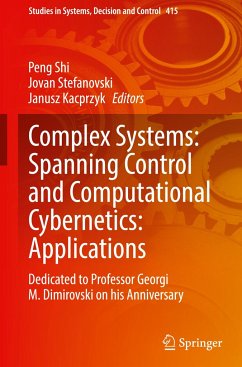
Control Systems: A Historical and Philosophical Perspective
History and philosophy of control systems

PAYBACK Punkte
61 °P sammeln!
This book offers an exploration of the historical and philosophical aspects of the field of control systems engineering. By examining the historical and philosophical underpinnings of control systems, this book provides a holistic understanding of the challenges faced by control engineers and the need for a multidisciplinary approach.Written for engineers, scientists, and students, this book delves into the evolution of control systems theories from ancient times to the present day, highlighting the key contributions of influential thinkers and innovators. The book also explores how philosophi...
This book offers an exploration of the historical and philosophical aspects of the field of control systems engineering. By examining the historical and philosophical underpinnings of control systems, this book provides a holistic understanding of the challenges faced by control engineers and the need for a multidisciplinary approach.
Written for engineers, scientists, and students, this book delves into the evolution of control systems theories from ancient times to the present day, highlighting the key contributions of influential thinkers and innovators. The book also explores how philosophical concepts, such as induction, falsification, and process philosophy, have shaped our understanding of control systems.
The book's unique approach combines historical narratives with philosophical perspectives to provide a deeper understanding of the field. By examining the historical development of control systems, you will gain insight into the motivations and technological constraints that have influenced the evolution of control systems analysis and design methodologies. From the early applications of automation to modern and postmodern control systems, which rely on sophisticated algorithms and artificial intelligence, this book provides a comprehensive understanding of the field's progress.
The book concludes by examining the future of control systems through the perspectives of leading control scientists and engineers. This comprehensive approach will equip the reader with a deeper understanding of the field to tackle complex problems in control systems analysis and design.
Written for engineers, scientists, and students, this book delves into the evolution of control systems theories from ancient times to the present day, highlighting the key contributions of influential thinkers and innovators. The book also explores how philosophical concepts, such as induction, falsification, and process philosophy, have shaped our understanding of control systems.
The book's unique approach combines historical narratives with philosophical perspectives to provide a deeper understanding of the field. By examining the historical development of control systems, you will gain insight into the motivations and technological constraints that have influenced the evolution of control systems analysis and design methodologies. From the early applications of automation to modern and postmodern control systems, which rely on sophisticated algorithms and artificial intelligence, this book provides a comprehensive understanding of the field's progress.
The book concludes by examining the future of control systems through the perspectives of leading control scientists and engineers. This comprehensive approach will equip the reader with a deeper understanding of the field to tackle complex problems in control systems analysis and design.












